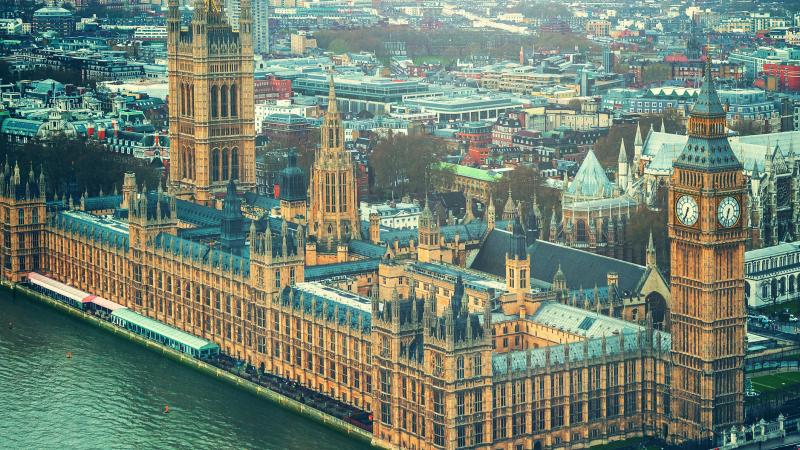Inflation woes jeapordize Biden's infrastructure plan
With prices rising at a 5.4% annual rate, Republican support for a $1.2 trillion bipartisan infrastructure framework is softening.
President Joe Biden's infrastructure bill is receiving fresh opposition from Republicans concerned that rising inflation, and the government spending that contributes to it, means the U.S. should take a step back from the plan.
Biden introduced a roughly $2 trillion infrastructure plan earlier this year, which was later cut down to $1.2 trillion after negotiations with Republicans. The release of the $1.2 trillion infrastructure framework gave new hope for the bill's passage, but news that Democrats planned to pass a second round of spending through the reconciliation process irked Republicans, who have since indicated their support of the $1.2 trillion framework is in jeopardy.
Biden has also taken fire for months of federal data showing the highest inflation levels in more than a decade.
Now, this week marks a critical juncture for Biden to get support for his plan before time, and momentum, runs out.
The reconciliation plan, $3.5 trillion in federal spending spearheaded by U.S. Sen. Bernie Sanders (I-Vt.), includes a laundry list of Democratic spending proposals not traditionally considered infrastructure, from health care to climate change spending.
Pointing to "growing inflation," U.S. Sen. Rick Scott (R-Fla.) cautioned against Biden's spending plans.
"We need real spending reform before we consider increasing the debt ceiling," he said. "We need reform like my Federal Debt Emergency Control Act, which prevents Washington politicians from mindlessly spending by requiring that two-thirds of the Senate vote to increase the debt before approving any bill. This isn't political, it's good government, and it's common sense. Every fiscally responsible Republican and Democrat should be focused on the debt crisis before us. We cannot allow Congress to continue mortgaging the futures of our children and grandchildren."
Recent federal data showed that the all items index spiked 5.4% in the last 12 months, the most significant increase since the 2008 financial crisis.
"For a long time, I and others have talked about how this will affect our children, grandchildren, and great grandchildren down the road," U.S. Sen. Mike Lee (R-Utah) said from the Senate floor. "And this will be a real consequence: They will in fact be saddled with debt they have not incurred, and forced to pay for it. It will be little comfort to the poor and middle class who feel the buying power of their paycheck shrink each week, that politicians can vote 'yes' on large spending packages for short-term political gain."
Joel Benenson, who headed up polling for President Barack Obama, and key Biden advisor Celinda Lake have warned Democrats about runaway federal spending going into the midterm elections. Lake has pointed to voters who are concerned about inflation as well.
A Harvard CAPS/Harris poll from June found that 85% of Americans are concerned about inflation, and the American Action Network released a poll earlier this month that found 88% of Americans are worried about the rising cost of living.
Republican campaign operatives have taken note and have already begun hammering "Bidenflation" as a talking point going into the 2022 elections.
"Telling voters that inflation doesn't matter when they are paying higher prices for groceries, gas, and just about everything else is incredibly out of touch," said Mike Berg, spokesman for the National Republican Congressional Committee.
Biden, though, has pushed back, saying the economy is recovering post-COVID and that inflation will level out by next year.
"Some folks have raised worries that this could be a sign of persistent inflation," Biden said. "But that's not our view. Our experts believe and the data shows that most of the price increases we've seen are — were expected and expected to be temporary. The reality is, you can't flip the global economic light back on and not expect this to happen."
He also pointed to job gains so far during his administration.
"We've gone from 60,000 jobs per month to 60,000 jobs every three days — more than 600,000 jobs per month since I took office," Biden said. "More than 3 million new jobs all told. That's the fastest growth, I'm told, at this point in any administration's history."
Despite Biden's optimistic rhetoric, many Senate Republicans are not convinced.
"The consequences, however, are no longer something we are facing in the distant future — but also what we are facing today," Lee said. "They've caught up to us. ... I vote 'no' when I see how the consequences will affect those I represent in real, everyday life — not just the intended consequences of legislation that might indeed have a good goal, but the unintended consequences also. I vote 'no' if it will mean saying 'yes' to what really matters, what really counts, for making everyday life better for Utahns and hardworking Americans across the country."
President Joe Biden’s infrastructure bill is receiving fresh opposition from Republicans concerned that rising inflation, and the government spending that contributes to it, means the U.S. should take a step back from the plan.
Biden introduced a roughly $2 trillion infrastructure plan earlier this year, which was later cut down to $1.2 trillion after negotiations with Republicans. The release of the $1.2 trillion infrastructure framework gave new hope to the bill's passage, but news that Democrats planned to pass a second round of spending through the reconciliation process irked Republicans, who have since indicated their support of the $1.2 trillion framework is in jeopardy.
Biden has also taken fire for months of federal data showing the highest inflation levels in more than a decade.
Now, this week marks a critical juncture for Biden to get support for his plan before time, and momentum, runs out.
The reconciliation plan, $3.5 trillion in federal spending spearheaded by U.S. Sen. Bernie Sanders, I-Vt., includes a laundry list of Democratic spending proposals not traditionally considered infrastructure, from health care to climate change spending.
Pointing to “growing inflation,” U.S. Sen. Rick Scott, R-Fla., cautioned against Biden’s spending plans.
“We need real spending reform before we consider increasing the debt ceiling,” he said. “We need reform like my Federal Debt Emergency Control Act, which prevents Washington politicians from mindlessly spending by requiring that two-thirds of the Senate vote to increase the debt before approving any bill. This isn’t political, it’s good government and it’s commonsense. Every fiscally responsible Republican and Democrat should be focused on the debt crisis before us. We cannot allow Congress to continue mortgaging the futures of our children and grandchildren.”
Recent federal data showed that the all items index spiked 5.4% in the last 12 months, the most significant increase since the 2008 financial crisis.
“For a long time, I and others have talked about how this will affect our children, grandchildren, and great grandchildren down the road,” U.S. Sen. Mike Lee, R-Utah, said from the Senate floor. “And this will be a real consequence: They will in fact be saddled with debt they have not incurred, and forced to pay for it. It will be little comfort to the poor and middle class who feel the buying power of their paycheck shrink each week, that politicians can vote ‘yes’ on large spending packages for short-term political gain.”
Joel Benenson, who headed up polling for President Barack Obama, and key Biden advisor Celinda Lake have warned Democrats about runaway federal spending going into the midterm elections. Lake has pointed to voters who are concerned about inflation as well.
A Harvard CAPS/Harris poll from June found that 85% of Americans are concerned about inflation, and the American Action Network released a poll earlier this month that found 88% of Americans are worried about the rising cost of living.
Republican campaign operatives have taken note and have already begun hammering “Bidenflation” as a talking point going into the 2022 elections.
“Telling voters that inflation doesn’t matter when they are paying higher prices for groceries, gas, and just about everything else is incredibly out of touch,” said Mike Berg, spokesman for the National Republican Congressional Committee.
Biden, though, has pushed back, saying the economy is recovering post-COVID and that inflation will level out by next year.
“Some folks have raised worries that this could be a sign of persistent inflation,” Biden said. “But that’s not our view. Our experts believe and the data shows that most of the price increases we’ve seen are – were expected and expected to be temporary. The reality is, you can’t flip the global economic light back on and not expect this to happen.”
He also pointed to job gains so far during his administration.
“We’ve gone from 60,000 jobs per month to 60,000 jobs every three days — more than 600,000 jobs per month since I took office,” Biden said. “More than 3 million new jobs all told. That’s the fastest growth, I’m told, at this point in any administration’s history.”
Despite Biden’s optimistic rhetoric, many Senate Republicans are not convinced.
“The consequences, however, are no longer something we are facing in the distant future – but also what we are facing today,” Lee said. “They’ve caught up to us. … I vote ‘no’ when I see how the consequences will affect those I represent in real, everyday life – not just the intended consequences of legislation that might indeed have a good goal, but the unintended consequences also. I vote ‘no’ if it will mean saying ‘yes’ to what really matters, what really counts, for making everyday life better for Utahns and hardworking Americans across the country.”
















